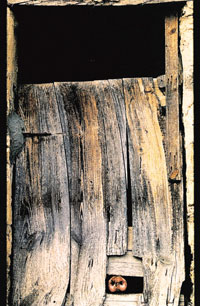This week we shall be taking a look at Ibiza’s legendary bars as well as a rather special local beverage, but to start with a word on the person who first made book-collecting fashionable. According to Lionel Casson, author of the groundbreaking Libraries in the Ancient World (2001), the first properly-attested bibliomaniac was none other than Aristotle. So extraordinary was his collection that when Ptolemy of Alexandria decided to add a little cultural gloss to his upstart dynasty, the learned Stagyrite’s library provided the blueprint. Aristotle’s scrolls were eventually inherited by some distant relatives in Asia Minor, who resorted to hiding them in a cave when the ruler of neighbouring Pergamum took up book-collecting. 200,000 of the Pergamum scrolls (mostly of parchment, which derives from this place-name) were later purloined by Mark Anthony and presented to Cleopatra in rival Alexandria as a special token of affection. Back to Aristotle’s pride and joy, it was the bibliophile Apellicon who brought the collection back to Athens, but not for long. He couldn’t resist showing some choice items off in Rome - with the result that after seizing Athens in 86 BC, Sulla swiped the lot and hauled them off to the Eternal City. The priceless bequest disappeared from the face of the earth when the dictator’s spendthrift son Faustus disposed of it to pay some debts. Tempus edax rerum. Time, the devourer of all things.
Although Aristotle never wrote about Ibiza, he did have something to say about the alcoholic muse: 'Men who have been intoxicated with wine fall down face foremost, whereas they who have drunk barley beer lie outstretched on their backs.' What would he have made of absinthe, one wonders? It was known to the ancient Greeks as apsinthion (‘undrinkable’, the wormwood herb making it very bitter), an elixir and cure for bad breath. To Parisian bohemians it was la fée verte - ‘the green fairy’ - as the viridescent spirit, a veritable muse, was said to stimulate the creative juices. For Ibicenco peasants, however, the cocktail had a different name. In a travel piece originally written for The New Yorker, Norman Lewis singled it out for special mention:
The proper drink, though, of Ibiza, is suisse - pronounced as if the final ‘e’ were accented. This is absinth mixed with lemon juice, and costs one peseta a glass. At the colmado of San Carlos - a village once famous for classing as ‘foreigners’ all persons not born in the village - you can see the customers on Sundays line up, a glass of suisse in hand, to receive an injection of vitamin B in the left arm, administered by the proprietress, Anita. The injection costs 5 pesetas, and is supposed to ensure success in all undertakings, especially those of the heart, during the ensuing week.
Norman Lewis, The Changing Sky (1959), p. 213
This Ibicenco term (suissé or, more correctly, suïsser) may derive from the fact that the modern form of absinthe was created in Switzerland by a doctor fleeing the French Revolution. Alternatively, it may derive from ‘Suisse La Bleue’ - the most sought-after brand in the world today, straight from the foothills of the Alps. In a later article Lewis wrote that absinthe was drunk in such quantities that it caused the peasant women’s hair to fall out. Be this as it may, as the preferred local tipple - after vi pagés - it was highly appropriate that when Peter Kinsley decided to write a book about bar-life in Ibiza, The Green Fairy became its working title. This book has just appeared in print as part of a larger work, Bogged Down in County Lyric, whose title derives from a passing comment by American writer and absinthe-connoisseur Stephen Seley: ‘We’re bogged down in County Lyric. All I ever wanted to do was write something that would sing down the centuries.’ Barely three decades down the chronological highway, Seley’s last published work, The End of Mercy (1969) is well off-key. Here is its final page - a fairly typical sample - to dispel any doubts:
MERCY AROSE
or:
‘To what do you attribute your success, Mr Seley?’
‘Failure.’ *
* this asterisk’s for fun*
* so is this one *
* and this? *
* simply rhymes with parenthesis, now) closed *
* and that alors? left lying on the floor of Mercy’s ...mind? *
* it (Mercy, too) WILL arise in Volume Two, whenwe’ll try again *
* alors ...
Stephen Seley, The End of Mercy, p. 222
Yes - the leaden wand of the green fairy. Published in Amsterdam, double Dutch is the prevailing idiom of this strange curio from Bibliomaniac’s Corner.
No such charge can be levelled at Bogged Down, although the first third has a touch of Joycean stream-of-consciousness, which encourages speed-reading up to the Ibiza chapters (pp. 135-351). It forms the third volume of a projected tetralogy, the narrative being taken up where the author left off in Volume Two, Don’t Tell My Mother I’m a Newspaperman... Kinsley, who styles himself ‘McGinn’ and writes in the third person throughout, arrives in New York on the eve of the American launch of his first novel, Three Cheers for Nothing. We follow some breathless globe-hopping for eleven chapters before eventually coming to rest in Ibiza’s Calle Mayor. The year is 1969, inland from Murcia people are just coming to grips with forks, and off the Ibizan waterfront, Seley is expounding the principal advantage of life on the White Island: ‘You can get a litre of gin for nothing. Of course, you have to eat the occasional orange for your health.’
The reader can tell it’s Ibiza because of the names: not Seley, but Steve Primero; the supporting cast include Far Out Phyllis, Jumping Susan (who cured a fit of depression by jumping from a five-storey apartment, hitting each balcony on then way down), Nescafé Jack, Crazy Hans, Finnish Dora, Sin Zapatos (a Swede who always walked barefoot), Cherokee Frank, Pot Peggy (whose children thought their surname was Pot), Peter the Book, Anna Banana, Rick the Prick, Kamikaze Schmidt, Too Much Tommy, Gordon the Flute, Hairy Pat, Charlie 103, Mad Mike, Wanted John (on the run from the law, he became Unwanted John when the authorities dropped the charge). Even the dogs have original labels - Sir Edward, Stroppy and No-Name. Kinsley often uses these sobriquets to brilliant effect:
‘Jill the Pill’s back,’ said George as he held the door.‘Yes, and guess who’s with her? Chelsea Elsie.’‘What? Randy Mandy’s friend?’
Bogged Down in County Lyric, p. 221
George Llewellyn was master of ceremonies at the George & Dragon, a bar in the Calle Mayor, nearby Wauna’s being owned by a large and formidable Anglo-American (Wauna Paul) who played up the fire-breathing beast for passing trade. Many of the best one-liners come from this amazing duo, and the present writer takes off his hat to Peter Kinsley for having the presence of mind and journalistic savvy to record them for posterity.
It is quite a line-up: Steve Primero, the archetypal alcoholic writer, penniless, perennially plastered, quick to take offence and unrelentingly rude; Tristan Jones, an old salt with a wicked sense of humour; George and Wauna with their rapier-like repartee; Doreen on her perch in the corner (‘I’m half Irish and half pissed and I came to Spain to get away from twats like you.’); and Dora and Lena from Helsinki, trying to raise the tone just a little:
‘They’re at it again,’ said the British tourist to his wife. ‘I won’t ’ave it.’ He stood up and walked over to Dora, a rotund and formidable blonde even more amply proportioned than Doreen.‘Would you mind watching your language,’ said the tourist.‘What are you talking about?’‘I said ‘watch your language,’ - there’s women and children present ’ere.’ He pointed to his wife and children.‘But what has that got to do with me?’‘We’ve had enough of it. That feller there -’ he pointed to Mad Mike, ‘was ’effing andblindin’ last night when we were in ’ere. You should moderate your language when women and children are present and stop swearing.’‘But I wasn’t swearing.’‘It sounded very much like it to me.’‘We are speaking the Finnish language together. Urpa, Lena and I are from Helsinki.Urpa is a painter, Lena is a journalist and I teach music and art.’‘Oooh, I’m very very sorry, Madam, I’m sure. I do apologise. Can I get you a drink tomake up for my mistake?’‘Three vodkas and a whisky for Mike.’
Bogged Down in County Lyric, pp. 158-9
Just another day in a soggy corner of La Marina. Tristan Jones, as mentioned in the previous article, was a prolific and highly-successful author of yachting tales, among which Yarns (1990) includes a chapter on Ibiza. When not eyeing up local talent (including one of Abel Matutes’s daughters: ‘she’s twenty-three and even now she has to be in by nine o’clock at night.’) his main hobby seems to have been picking scraps with other ‘boaties’:
Jones caught him with a right hook that sent the fisherman flying into the doorway of a souvenir shop. The gorgeous Miss Matutes took the opportunity to use her discretion and hurry off, consulting the minuscule white gold wrist watch that her father had given her for staying a virgin, and wondering if she would dare to accept the little Welsh captain’s invitation to - what had he called it? ‘Tea and crumpet’ - aboard his little yacht…
Bogged Down in County Lyric, pp. 299
The reviewer is spoiled by the sheer number of anecdotes in this marvellous book - the lynching of the municipal dog-catcher by a pack of beatnik women, the mounted Guardia routing a barfull of hippies, the chair thrown through the Post Office window by Steve Seley and the clerk’s immediate response (‘Thank you Señor Esteve, we need some fresh air in here’). But to end we will return to our fairy theme, used here by Kinsley to christen a gay bar up in Dalt Vila, based on a real establishment which opened (under a different name) near present-day Anfora. Run by an English-Spanish couple it managed against all expectations to survive for two whole months in the early 1970s. In the book though, it is closed down the following day. Here we are on opening night:
At the door, Doris Karloff clanked as he greeted the guests with chain-mailed gauntlet. Ewald came as a Green Fairy, to the titters of the assembled throng.‘He’s misunderstood again,’ someone said. ‘It’s the name of the drink they’re serving -that mind-blowing stuff that tastes like licorice.’‘No,’ said Youssef, ‘Doris wants to call the bar The Green Fairy. His English is not verygood.'‘That Cockney barman, George … I asked him for a shandy and he said ‘Do you want itin a straight glass or a gay glass’, the cheeky sod.Two municipal policemen, in their navy blue uniforms with the green piping, stopped suddenly at the packed throng in the entrance to the new bar where men could dance with men. They pushed their way through until they could see what was going on inside and their faces turned the colour of the whitewash on the bar walls. Breaking, unusually, into a trot, they hastened towards Headquarters with the news that either the foreigners had gone mad or there had been an invasion from Mars. They had seen Ewald dancing with Gordon the Flute, Doris Karloff doing the rumba with Youssef wearing Wauna’s curtains as a shirt, and the waiter from Es Quinques in full bridal dress with a bouquet of fake orange blossom trying to get in to ask Doris Karloff for a dance.
Bogged Down in County Lyric, pp. 324-327
Martin Davies
martindavies@ibizahistoryculture.com

